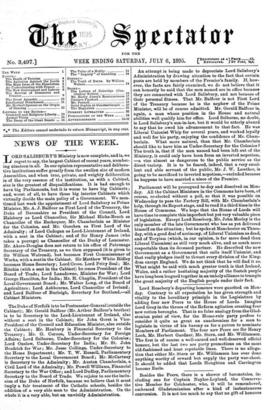NEWS OF THE WEEK.
T4ORD SALISBURY'S Ministry is now complete, and is, we regret to say, the largest Cabinet of recent years, number- ing nineteen in all. In our opinion representative and delibera- tive institutions suffer greatly from the swollen size of modern Assemblies, and when true, private, and weighty deliberation is of the very essence of the institution, as with a Cabinet, size is the greatest of disqualifications. It is bad enough to have big Parliaments, but it is worse to have big Cabinets ; and, worst of all, to have those big interior Cabinets which virtually decide the main policy of a Government. We men- tioned last week the appointment of Lord Salisbury as Prime Minister, Mr. A. J. Balfour as First Lord of the Treasury, the Duke of Devonshire as President of the Council, Lord Halsbury as Lord Chancellor, Sir Michael Hicks-Beach as Chancellor of the Exchequer, Mr. Chamberlain as Minister for the Colonies, and Mr. Goschen as First Lord of the Admiralty ; of Lord Cadogan as Lord-Lieutenant of Ireland, with a seat in the Cabinet; and of Sir Henry James (who takes a peerage) as Chancellor of the Duchy of Lancaster. Mr. Akers-Douglas does not return to his office of Patronage Secretary of the Treasury, as we then supposed (it is given to Sir William Walrond), but becomes First Commissioner of Works, with a seat in the Cabinet. Sir Matthew White Ridley becomes Home Secretary; Lord Cross, Lord Privy Seal ; Mr. Ritchie (with a seat in the Cabinet) becomes President of the Board of Trade ; Lord Lansdowne, Minister for War ; Lord George Hamilton, for India ; Mr. H. Chaplin, President of the Local Government Board ; Mr. Walter Long, of the Board of Agriculture ; Lord Ashbourne, Lord Chancellor of Ireland ; and Lord Balfour of Burleigh, Secretary for Scotland,—all Cabinet Ministers.








































 Previous page
Previous page